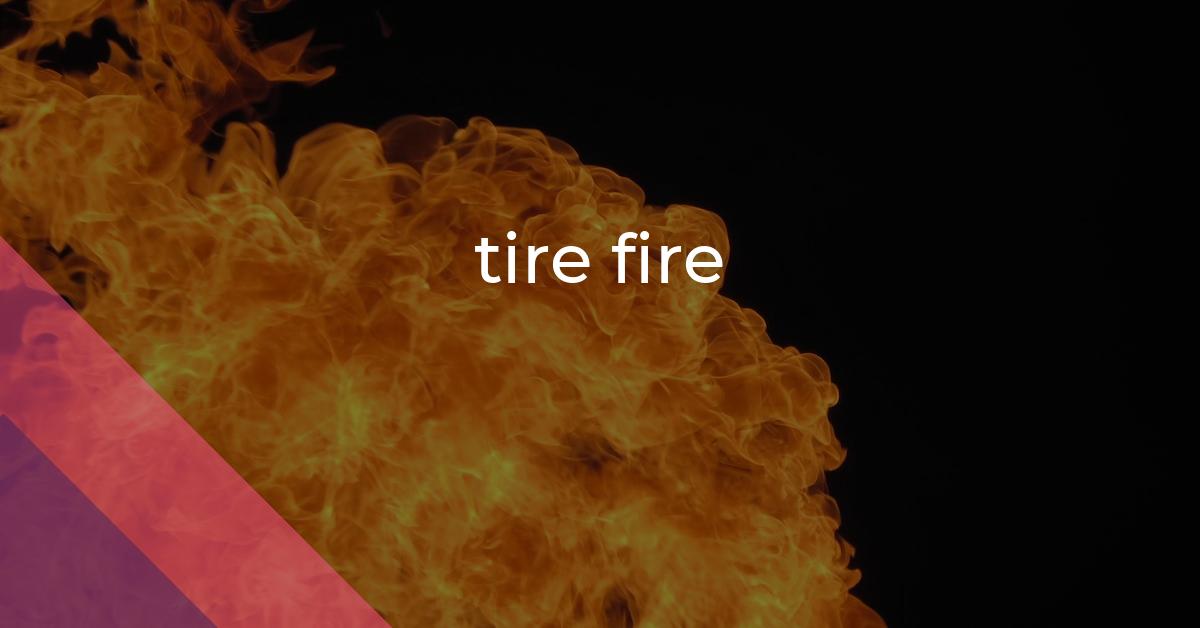tire fire: Idiom Meaning and Origin
What does ‘tire fire’ mean?
The idiom "tire fire" is used to describe a situation that is chaotic, out of control, or a complete disaster. It implies a sense of urgency and a need for immediate attention to resolve the problem. The term "tire fire" is often used metaphorically to refer to a situation that is incredibly difficult to handle and is causing a lot of trouble.

Idiom Explorer
The idiom "the wheels fell off" is used to describe a situation where something that was once functioning smoothly suddenly goes wrong or falls apart completely.
The idiom "set one's hair on fire" means to become very excited, frantic, or panicked. It is often used to describe a state of extreme urgency or alarm.
The idiom "powder keg" refers to a situation or place that is highly volatile and likely to explode or escalate into violence or chaos. It implies a lot of tension and potential danger, similar to a keg filled with gunpowder that can easily be ignited.
The idiom "pour gasoline on the fire" means to aggravate or worsen a situation by adding more conflict or controversy.
The idiom "pour fuel on the fire" means to worsen a situation or make a problem even more intense or volatile by saying or doing something that aggravates it further.
The idiom "on fire" means to be performing exceptionally well or having great success in a particular activity. It is often used to describe someone who is highly skilled, talented, or in a state of intense enthusiasm or energy.
An idiom referring to a situation or event that appears to be chaotic, disorganized, or confusing.
The idiom "kindle-fire" means to ignite or arouse strong emotions or passions within someone or a situation.
The idiom "irons in the fire" means having multiple projects or tasks in progress or pursuing multiple opportunities at the same time. It suggests being busy with various things and being proactive in pursuing new prospects or ventures.
Decoding the Blaze
The idiom "tire fire" is a commonly used expression in American English. It is typically used to describe a chaotic or disastrous situation that is difficult to control or contain, similar to a large fire fueled by burning tires. The idiom is often used figuratively to convey the sense of something being out of control, overwhelming, or in a state of complete chaos.
One clear fact about the idiom "tire fire" is that it originates from the literal sense of fires involving burning tires. Tire fires are notoriously challenging to extinguish due to the nature of the materials involved. The release of toxic fumes and intense heat produced by burning tires makes these fires particularly difficult to put out. This real-world context has contributed to the idiom's figurative meaning, emphasizing the idea of a situation that is hard to contain or resolve.
When analyzing the meaning of the idiom "tire fire," it becomes apparent that it is often used to express frustration, exasperation, or a sense of hopelessness in the face of chaos or turmoil. It suggests a situation spiraling out of control, with little chance for resolution or improvement. The idiom's strong visual imagery of a tire fire adds to its impact, evoking a sense of chaos and destruction.
The idiom "tire fire" can also be used humorously or sarcastically, particularly when discussing mundane or trivial matters. By using the idiom in such a manner, speakers can exaggerate the level of chaos or frustration that they feel, injecting irony or comedic effect into their statements.
Although the idiom "tire fire" primarily conveys a negative connotation, the exact level of severity implied can vary depending on the context and the speaker's intent. In some cases, it may simply express a moderate level of annoyance or frustration, while in others, it can evoke a more extreme sense of chaos or disaster.
The versatility and evocative imagery of the idiom "tire fire" contribute to its widespread usage in American English. Its nuanced meaning allows for a range of emotional nuances and rhetorical strategies. It encapsulates the idea of a chaotic and overwhelming situation, drawing its metaphorical meaning from the difficulty of extinguishing actual fires involving burning tires.
Now, let's explore how the idiom "tire fire" relates to other idioms in the English language.
One related idiom is "fight fires." This expression is often used to describe the act of dealing with urgent or unexpected problems as they arise. It conveys the sense of constantly being in a reactive mode, extinguishing metaphorical fires one after another. When used in conjunction with the idiom "tire fire," it emphasizes the overwhelming nature of the chaotic situation, as if multiple fires are burning simultaneously.
Another related idiom is "fire drill." This phrase is typically used to describe a practice or simulation of emergency procedures. It conveys the sense of urgency and the need to act quickly and efficiently in response to a potential or actual crisis. When applied to a "tire fire," the idiom suggests the need for a structured and coordinated approach to deal with the chaotic situation in a timely manner.
The idiom "hair-on-fire" is also related to the concept of a "tire fire." It is commonly used to describe a state of extreme panic or frenzy. The visual image of one's hair being on fire conveys the sense of something being completely out of control and in need of immediate attention. When used in the context of a "tire fire," the idiom amplifies the level of chaos and urgency, emphasizing the need for swift and decisive action.
Lastly, the idiom "burn rubber" is connected to the concept of a "tire fire" as well. This expression is often used to describe the act of accelerating rapidly in a vehicle, typically resulting in the tires leaving skid marks on the road. It conveys a sense of speed, excitement, and a willingness to take risks. When used metaphorically in relation to a "tire fire," the idiom suggests the need to take immediate and assertive action to address the chaotic situation, as if driving full speed ahead to resolve the problem at hand.
Example usage
Examples of how the idiom *tire fire* can be used in a sentence:
1. The team's performance was a complete tire fire, nothing seemed to go right for them.
2. The company's financial situation is a tire fire, with no clear solution in sight.
3. The politician's speech turned into a tire fire, as he was constantly contradicting himself and making false promises.
More "Disasters" idioms



